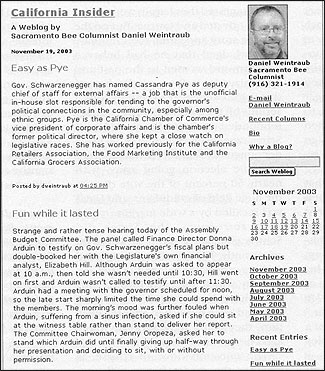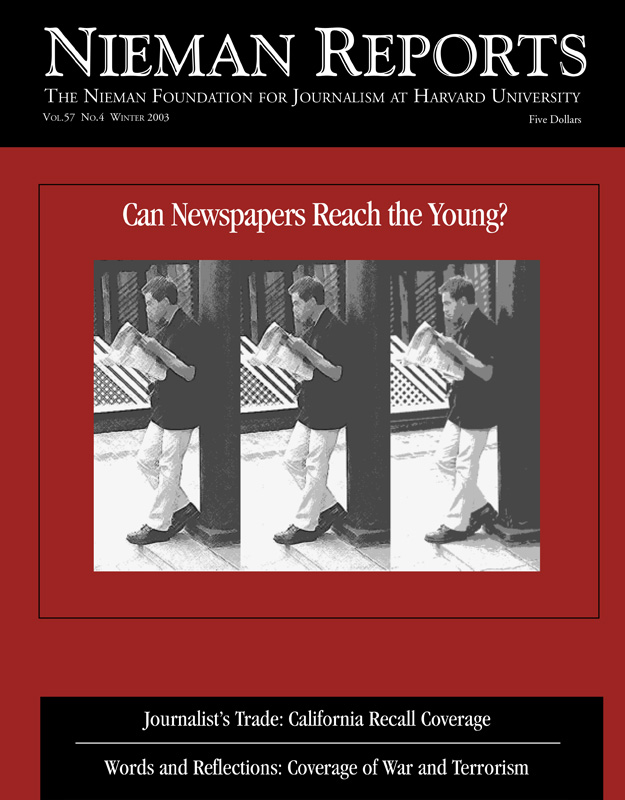After 20 years writing about politics and public policy to some local note but no national acclaim, I managed to become almost famous this year—by dispensing speculation and instant analysis on the Internet and punditry on cable television.
I owe it all to the California recall and to my Weblog.
When I started the Weblog—known as the California Insider—I had no idea that the attempt to remove Governor Gray Davis from office would take root and evolve into the biggest political story of the year. Or that the Internet genre known commonly as the blog would come to play such a prominent role in the coverage.
For the uninitiated, a blog is an online journal of usually short, spontaneous items updated frequently as events develop. Many blogs are personal diaries read only by the author’s family and close friends. Even the more prominent bloggers are usually nonjournalists who link to printed stories and critique them on their own time. Others are created and updated by college professors or experts in their fields.
Blogs, then, represent a democratization of journalism, or at least opinion journalism, because they allow anybody, just about anywhere, to publish themselves and gain readers in relation to their talent, their relevance and, ultimately, their accuracy, regardless of their credentials.
Breaking News on My Blog
I was breaking new ground by combining full-time journalism as a three-times-a-week columnist for The Sacramento Bee and a full-time blog that I updated constantly from anywhere I had access to the Internet—from my desk, home, campaign bus, and other unpredictable locations. When I wrote for the California Insider, I commented on the news and broke some, too.
It was a perfect marriage of medium and message. The recall was a fast-moving story from the start, first with the signature count and then the watch to see which candidates would file to run. The final, 60-day sprint to Election Day was filled with unexpected twists and turns that I could report and then analyze on my blog 18 hours or more before they would appear in the print version of our newspaper. When I began the blog in early April, it was read by a few hundred people each day, mainly Capitol staff, lobbyists, political consultants, and colleagues in the press corps. By the end of the campaign, the blog was getting nearly 20,000 page views a day.
Some readers told me they would check the site eight or 10 times a day to see if anything was breaking on the story. Those readers included people from all over the world and many editors in newsrooms from Los Angeles to New York. One day, late in the campaign when I was riding on the Arnold Schwarzenegger bus tour, a reporter for another paper approached me after his editor had read an item I’d posted a few minutes earlier, called him, and asked him to check it out.
Ironically, the success of the blog was based on skills I’d long shunned as a journalist. In my 20 years as a beat reporter, I hated daily news, or at least the kind generated by politicians, which so often seemed artificial and often self-serving. Rather than staffing press conferences and sitting through staged committee hearings, I preferred enterprise stories and analysis. Now I found myself with a self-imposed deadline every minute, and I was filing items based not just on my reporting but also on press releases, campaign commercials, fundraising reports, and other routine developments.
While as a columnist I prefer policy to politics, my blog was filled with political scuttlebutt and speculation, the latest polls and observations on who was up and who was down. Naturally, TV loved it. I was soon in demand as a guest pundit for all three major cable television networks, and halfway through the campaign I signed on as an exclusive analyst with MSNBC. I was bemused if not surprised that family and friends who had rarely if ever read one of my 850-word columns on state policy were thrilled to see me on television offering my latest sound bites on the recall race.
Even if I was going against my instincts, I found that the blog helped improve my column. The constant writing loosened up my style and made me always ready to write whenever I sat down to craft my newspaper pieces. The increased feedback from readers also helped, especially tips and analysis that flowed in as people responded to my posts. I also was able to use the Web site as a public drafting board, posting segments that would grow into columns over a few days’ time.

The Blog and the Newspaper
I did stumble along the way. My newfound thirst for reporting breaking developments led me to post an item from a source close to Schwarzenegger saying the actor had decided not to run and would be holding a press conference to announce his decision. As it turned out, the press conference was postponed and ultimately canceled and Schwarzenegger, of course, did enter the race. Such are the hazards of reporting the news minute-by-minute as it develops.
I also became somewhat notorious after I posted a sharply worded commentary critical of Lt. Governor Cruz Bustamante, the major Democrat in the race. Protests from the newsroom led to a decision to have an editor pre-clear my items. Before then, I’d posted directly to the Web with a simultaneous copy sent to my line editor. When the paper’s ombudsman revealed this change in policy, it caused an uproar in the “blogosphere” among my new colleagues who believe that blogging and editing are incompatible because the craft is supposed to be spontaneous and unfiltered, then revised as readers jump in for a sort of interactive story session. Someone even started a “free Dan Weintraub” movement.
By Election Day, I was liberated, but not from my editors. Now that the campaign has ended and the transition to governing has begun, I’ve returned to the pace I intended all along: I post a few items a day, some tidbits but mostly analysis. Readers tell me they are having withdrawal pains. But there is simply no way to keep up the pace of the campaign and also publish three print columns a week and still find time to eat and sleep.
The electronic media have also retreated. When, the day after the election, they packed their bags and headed for the Kobe Bryant trial in Colorado or the presidential campaign trail in Iowa, they also stopped calling for instant analysis. My teenage son noted my absence from the tube and asked with all the sincerity a 14-year-old can muster: “What happened, did your 15 days of fame run out?”
I guess so. But the blog, and the column that begat it, continue.
Daniel Weintraub opines on California politics for the editorial pages of The Sacramento Bee. His Weblog and column archive are at www.sacbee.com/weintraub/index.html.


